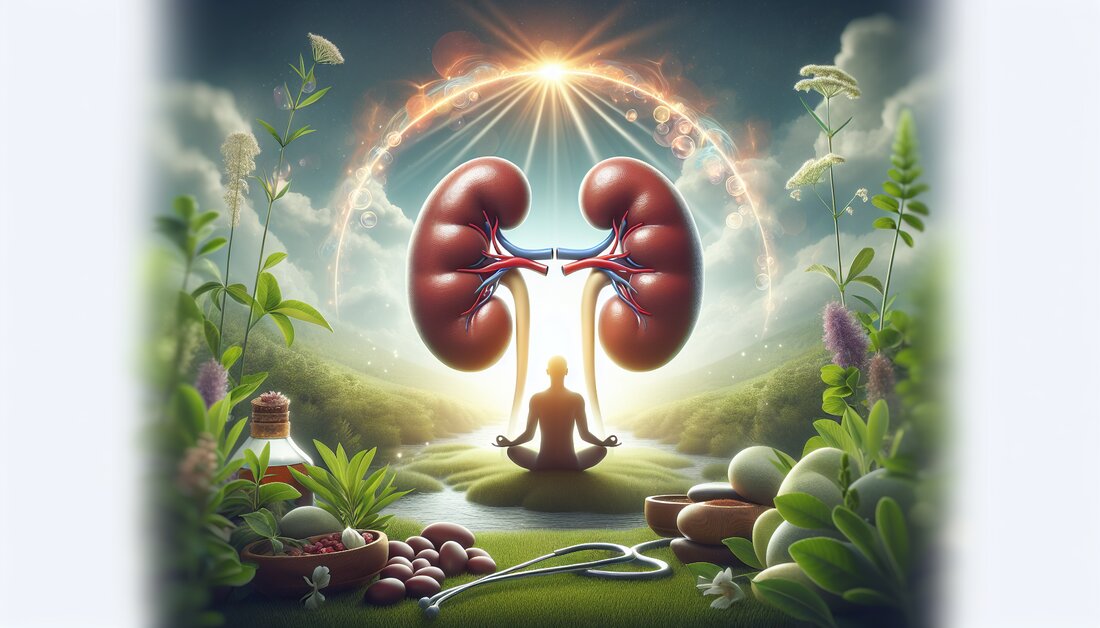Holistic therapy for kidney disease: hope without dialysis for a better quality of life
A 64-year-old CKD patient showed significant improvements in kidney function, quality of life and symptoms without side effects with integrative therapies (YNBLI). Further studies are needed.

Holistic therapy for kidney disease: hope without dialysis for a better quality of life
Chronic kidney diseases (CKDs) are health problems that cause the kidneys to gradually lose their functions. This process puts a lot of strain on those affected, as it not only affects their physical health, but also their quality of life and mental health. A new study shows that a comprehensive treatment approach tailored to the patient could be useful in dealing with CKD.
The study, published in December 2024, describes an innovative treatment program called YNBLI (Patient-Centered, Holistic Integrative Therapies). This program was used on a 64-year-old woman with various health problems including CKD, type 2 diabetes, hypertension, and knee osteoarthritis. Instead of dialysis, which is often considered the standard treatment for severe kidney disease, the patient chose YNBLI because she had concerns about dialysis.
After a ten-day hospital stay and a subsequent 16-week home use of the YNBLI program, the patient showed a significant improvement in her kidney function and blood values as well as her quality of life, without any negative side effects.
The results show that a patient-centered approach such as YNBLI could potentially be used as a complementary treatment modality for CKD. This type of holistic therapy could expand and improve current practices in the future, but needs to be validated through further research to confirm its effectiveness on a larger scale.
To better understand the topic, let's explain some basic terms:
- Chronische Nierenerkrankung (CKD): Eine langfristige Erkrankung, bei der die Nieren allmählich ihre Fähigkeit verlieren, das Blut effektiv zu filtern.
- Dialyse: Ein medizinisches Verfahren zur Entfernung von Abfallstoffen und überschüssigem Wasser aus dem Blut, das normalerweise von den Nieren durchgeführt wird.
- Patientenzentrierte Pflege: Ein Behandlungsansatz, der sich auf die individuellen Bedürfnisse und Vorlieben des Patienten konzentriert.
- Ganzheitlich: Ein Ansatz, der den gesamten Menschen in Betracht zieht, einschließlich seiner körperlichen, emotionalen und sozialen Bedürfnisse.
- Integrative Therapien: Die Kombination von konventionellen medizinischen Behandlungen mit ergänzenden oder alternativen Therapien.
Abbreviations:
- CKD: Chronic Kidney Disease
- YNBLI: Patientenzentrierte, Ganzheitlich Integrative Therapien
Effectiveness of patient-centered holistic integrative therapy for chronic kidney disease
The study investigates the use of patient-centered holistic integrative therapy (YNBLI) in a patient with chronic kidney disease (CKD). CKD places a significant burden on both the physical and mental health of patients. There is a growing need for interdisciplinary, patient-centered treatment approaches.
Methods
The study conducted YNBLI on a 64-year-old woman with CKD who also suffered from type 2 diabetes, high blood pressure and osteoarthritis. Because of her fear of the side effects and lifelong dependence on dialysis, she refused dialysis. Instead, she underwent a 10-day inpatient YNBLI program followed by a 16-week residential program.
Results
The patient showed significant improvement in renal function, hemoglobin levels, quality of life and symptoms. No adverse events were recorded during the 16-week follow-up period. These findings suggest that YNBLI may be an effective adjunct therapy for CKD.
| parameter | Before YNBLI | To YNBLI |
|---|---|---|
| Kidney function | Deteriorated | Significantly improved |
| Hemoglobin level | Low | Improved |
| Quality of life | Impaired | Increased |
discussion
This research highlights the potential of YNBLI as an adjuvant therapy in the treatment of CKD. The evidence of improvements in the patient's health suggests that YNBLI may help influence both physiological and psychological parameters. Further studies are needed to validate the full potential and long-term effects of this form of therapy.
Long-term research could examine whether YNBLI can be applied on a larger scale and which specific components of this intervention contribute most to improving clinical status.

 Suche
Suche
 Mein Konto
Mein Konto
